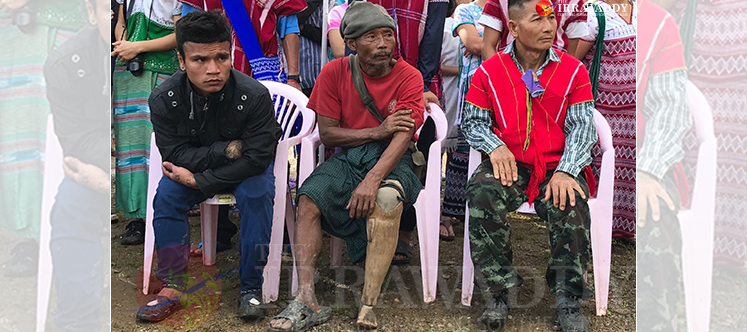CHIANG MAI, Thailand — The number of accidents caused by landmines and explosive remnants of war (ERW) continues to rise, and all stakeholders need to scale up efforts to protect children and families, according to UNICEF, citing information provided by the Myanmar Mine Risk Working Group (MRWG), an inter-ministerial agency.
At an event held in Naypyitaw on Wednesday to mark International Day for Mine Awareness and Assistance in Mine Actions, the UN agency, the European Union and other stakeholders warned that nine of Myanmar’s 14 states and regions continue to be “contaminated” with landmines and ERW, posing an ongoing threat to the lives of children and families. International Day for Mine Awareness is observed every April 4.
Some 42 landmine casualties were reported in the first quarter of 2018, according to UNICEF. In 2017, 176 casualties (including 52 fatalities) were reported, mostly in Kachin and Shan states, up from 161 in 2016. In those two years, one in four of those injured was a child, and one in four accidents was fatal, according to the agency.
“Even though data is still unreliable and many casualties occurring in the conflict areas go unrecorded, Myanmar has some of the world’s highest landmine incident rates,” June Kunugi, UNICEF representative to Myanmar, told The Irrawaddy via email.
Women and children accounted for 43 percent of the casualties in 2017, she said.
In 2012 Myanmar initiated the MRWG, an inter-ministerial and inter-agency coordination platform under the co-leadership of the Ministry of Social Welfare, Relief and Resettlement and UNICEF. Tasked with ensuring mine action intervention, it comprises representatives of 10 ministries, Myanmar’s military (the Tatmadaw), and 41 national and international organizations. Its has state-level platforms in Kachin, Shan, Kayah (Karenni) and Karen states.
With EU support, MRWG has conducted mine risk education sessions in nine states and regions: Kachin, Shan, Kayah, Karen, Mon, Rakhine and Chin states and Bago and Tanintharyi regions. The sessions take place in schools, communities and IDP camps. A number of organizations participating in the MRWG have opened support and rehabilitation centers for landmine victims and offered other forms of psychosocial assistance.
Despite the progress made over the past two years, Kunugi told The Irrawaddy, “there are still areas out of reach for MRE [mine-risk education] partners, for instance Tanai and Phakant in Kachin State, and Namhsan and Kyaukme in Shan State, where communities live threatened by the dangers of landmines and ERW.”
MRWG chairman U Myo Satt Aung told The Irrawaddy that additional mine awareness and victim support services would be implemented in other states and regions as soon as possible. He also serves as the deputy director general of the Rehabilitation Department under the Ministry of Social Welfare, Relief and Resettlement.
UNICEF urged the government “to improve data and information management systems” in order to develop more effective victim support services, which it said would also “be key for enabling survivors to have ongoing access to much-needed health and social services.”
At an event in Naypyitaw on Wednesday, the participating organizations concluded that “progress is possible if all parties work to enable mine risk education in hard-to-reach areas; invest more in assistance for survivors; and initiate landmine clearance wherever possible.”
The EU, UK Aid, UNICEF and their mine action partners urged the government to join the Mine Ban Treaty. Some 164 states have formally signed the treaty.
In a speech at the event on Wednesday, EU Ambassador Kristian Schmidt said he had been made aware that Myanmar was making preparations to join the treaty, and hoped it would do so soon.
He said the EU stood ready to support mine risk education and demining activities.
Schmidt called on all stakeholders – the government, the Tatmadaw and the ethnic armed organizations — “to do the right thing for the country, for unity, for peace and justice for the next generations: stop laying mines, ban them and let’s start the cleanup for a peaceful and prosperous future.”

















